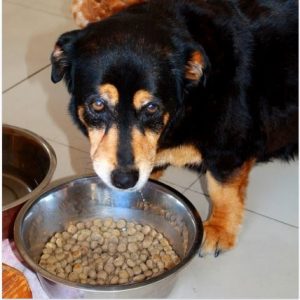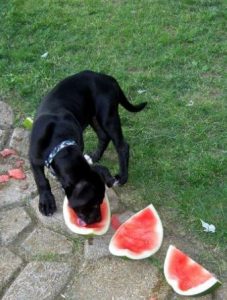You may have heard about functional foods for humans, foods that are jam-packed with health benefits on top of offering basic nutrition. Today, the trend of seeking out functional foods has also affected the dog food industry with more and more premium dog foods adding functional foods in their ingredient list. Dog owners preparing their dog foods at home may also be on the lookout for these healthy ingredients. Therefore, if you are wondering what foods are considered functional in your dog’s diet, you may find this list of functional foods for dogs helpful.
 A Word About Functional Foods for Dogs
A Word About Functional Foods for Dogs
As mentioned, functional foods are considered foods that are teeming with positive health benefits on top of offering basic nutrition. The purpose of feeding functional foods is therefore to provide nutritive value while promoting good health and lowering the risk for disease.
Of course, it’s important that perspective functional foods are free of chemicals and additives as this would defeat the whole purpose of eating functional foods. This means that it’s best to look for non GMO, organic sources. “An apple a day will cause the doctor to stay” rather than “away” if the apples you are eating are packed with pesticides!
As always, consult with your vet before adding any new foods to your dog’s diet. Not all functional foods are right for every dog, especially dogs suffering from underlying medical problems. For instance, fats may not be suitable for dog suffering from pancreatitis, green leafy vegetables many not be suitable for dogs suffering from bladder stones, while cruciferous vegetables may not be suitable for dogs with low thyroid levels.
If you cook your dog a home-made diet and want to add functional foods, consider consulting with a veterinary nutritionist to ensure that the diet is balanced and nutritionally complete.
Functional Carbohydrates for Dogs
Not call carbohydrates are bad for dogs, there are good carbs for dogs too. If you are totally avoiding feeding carbs to your dog, you may be missing out on these ingredients that are packed with benefits. Here are some functional carbohydrates that may prove beneficial to your dog.
While grains have recently received a bad rap in the food dog industry and there has been a surge of dog foods that are grain-free, it would be unjust pointing out the finger and labeling all grains as bad. Millet, quinoa, sorghum, and gluten-free oats are healthy, gluten free grains that don’t deserve a bad rap.
Just as in people, dogs can benefit from lightly steamed cruciferous vegetables such as broccoli, cauliflower, brussel sprouts, cabbage and bok choy. These sources of functional carbs are potent cancer fighting foods that are rich in antioxidants and therefore help reduce the numbers of free radicals in the body.
Green leafy vegetables are sources of important compounds that have anticancer benefits. These superfoods include kale, collard greens, mustard greens, turnip greens and dandelion greens. These green leafy vegetable are best if offered steamed so that they are more bioavailable.
There are many fruits that are functional and these comprise organic apples, bananas, blueberries, cranberries, cantaloupe and watermelon. While fruits contain sugar which can have a high glycemic index, this effect is balanced out by the fruit’s content of healthy fiber which helps insulate the sugar, explain veterinarian Dr. Jean Dodds and Diana Laverdure in the book “Canine Nutrigenomics.” Remember: never feed your dog grapes or raisins which are toxic to dogs.
Functional Proteins for Dogs
While dogs can thrive and survive without carbohydrates in their diet, proteins are a whole different story. Protein is the most important nutrient of all and it carries many important functions such as building muscle, providing essential aminoacids and regulating important systems in the dog’s body.
When we think of protein, the first thought goes out to meat, but there are many other sources of protein that can benefit dogs. Functional foods containing protein include organic milk, cheese and yogurt that comes from goat or sheep sources, organic eggs, fish that contain low levels of protein such as wild caught sardines, wild-caught salmon, pollack and catfish.
Among meat sources, organic bison, duck, goat, rabbit, turkey and venison are functional foods considering that they have a lower risk for causing food intolerance since most of them are novel protein sources that are not commonly consumed by dogs.
Functional Fats for Dogs
Unless your dog is suffering from pancreatitis or is overweight, you may find these functional fats beneficial to your dog. Fats are important because they provide your dog energy and work as a vessel for fat-soluble vitamins. Most likely, you are already familiar with the benefits of omega fatty acids and are already incorporating them in your dog’s diet.
The good news about feeding dogs fat is that dogs do not get heart attacks from eating fat as people do as they burn fat differently than humans.
What are some good functional sources of fat for dogs? Look for fish oil, coconut oil, olive oil, hemp oil, primrose oil, sunflower oil. Make sure though that these oils are expeller pressed rather than extracted with the use of hexane, a petroleum product that you certainly do not want anywhere near food. Other healthy fats are found in sardines and wild-caught salmon and novel meat sources described above. As always consult with your vet or veterinary nutritionist for dietary recommendation and dosages.
References:
- Functional Foods in Pets and Humans Alessandro Di Cerbo1 * Beniamino Palmieri2 Francesca Chiavolelli3 Gianandrea Guidetti3 Sergio Canello3 Intern J Appl Res Vet Med • Vol. 12, No. 3, 2014
- Canine Nutrigenomics, The New Science of Feeding Your Dog For Optimum Health, by Jean Dodds, Diana Laverdure



 A Word About Functional Foods for Dogs
A Word About Functional Foods for Dogs

